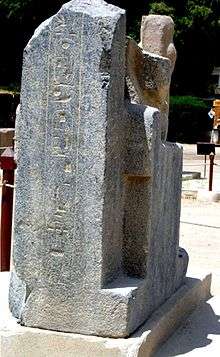Pedubast II
Pedubast II was a Pharaoh of Egypt associated with the 22nd or more likely the 23rd Dynasty. Not mentioned in all King lists, he is mentioned as a possible son and successor to Shoshenq V by Aidan Dodson and Dyan Hilton in their 2004 book, The Complete Royal Families of Ancient Egypt. They date his reign at about 743–733 BC, between Shoshenq V and Osorkon IV.[1]
| Pedubast II | ||||||||||||||||||||||||||||||||||||||||||||
|---|---|---|---|---|---|---|---|---|---|---|---|---|---|---|---|---|---|---|---|---|---|---|---|---|---|---|---|---|---|---|---|---|---|---|---|---|---|---|---|---|---|---|---|---|
 Part of a statue bearing the titulary of Pedubast II, from Memphis. | ||||||||||||||||||||||||||||||||||||||||||||
| Pharaoh | ||||||||||||||||||||||||||||||||||||||||||||
| ||||||||||||||||||||||||||||||||||||||||||||
| Father | Iuput II? | |||||||||||||||||||||||||||||||||||||||||||
Jürgen von Beckerath places Pedubast II within the reign of Piye and in the 23rd Dynasty and proposes a reign of about 736–731 BC for this pharaoh. The exact length of Pedubast's II's reign is uncertain.[2] Pedubast II may have been the son of Iuput II and the then serving nomarch in Athribis because the king list of Piye places next to Osorkon IV a Pedubast who is called a Prince of Athribis.
Pedubast's II's royal name or prenomen was Sehetepibenre and he is attested as a king at Tanis—or at least a local Delta ruler who controlled this city—by several stone blocks found there bearing his royal titulary.[3] Kenneth Kitchen, however, prefers to date Pedubast II's kingship around the time of the Assyrian invasion under Esarhaddon and then Ashurbanipal in the mid-660s BC.[4] Such is the degree of uncertainty surrounding this king's timeline during the Third Intermediate Period of Egypt (c. 1069 BC – 664 BC).
References
- Aidan Dodson, Dyan Hilton: The Complete Royal Families of Ancient Egypt, Thames & Hudson, London 2004, ISBN 0-500-05128-3, S. 210–223.
- Jürgen von Beckerath: Das Verhältnis der 22. Dynastie gegenüber der 23. Dynastie. In: Nicole Cloth: Es werde niedergelegt als Schriftstück – Festschrift für Hartwig Altenmüller zum 65. Geburtstag. Buske, Hamburg 2003. ISBN 3-87548-341-3, S. 31–35.
- K.A. Kitchen, "The Third Intermediate Period in Egypt (c.1100–650 BC)," Aris & Phillips Ltd. 3rd edition (1996), pp.97 & 129
- Kitchen, p.396
Further reading
- N. Dautzenberg, Bemerkungen zu Schoschenq II., Takeloth II. und Pedubastis II, Göttinger Miszellen 144 (1995), 21–29
- Dan'el Kahn, A Problem of Pedubasts?, Antigua Oriente 4 (2006), 23–42